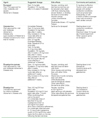Abstract
The pharmacological treatment of Alzheimer's disease is based on symptomatic therapy of cognitive decline and behavioral problems. Numerous therapies have been investigated for the treatment and prevention of Alzheimer's disease. We reviewed the current evidence-based medical research and guidelines of treatment for Alzheimer's disease. The use of cholinesterase inhibitors (ChEI) and N-methyl-D-aspartate (NMDA) inhibitors can bring about significant but modest therapeutic improvement. There is insufficient evidence to recommend vitamine E, estrogen, ginko biloba, or nonsteroidal anti-inflammatory drugs (NSAIDs) for the prevention or treatment of Alzheimer's disease. This article reviews the available data on current pharmacological treatments through evidence-based medicine.
Figures and Tables
References
1. American Psychiatric Association (APA). Practice guideline for the treatment of patients with Alzheimer's disease and other dementias. 2007. 2nd Edition. 1–86.
2. Burns A, O'Brien J, Auriacombe S, Ballard C, Broich K, Bullock R, Feldman H, Ford G, Knapp M, McCaddon A, Iliffe S, Jacova C, Jones R, Lennon S, McKeith I, Orgogozo JM, Purandare N, Richardson M, Ritchie C, Thomas A, Warner J, Wilcock G, Wilkinson D. BAP Dementia Consensus group. British Association for Psychopharmacology. Clinical practice with anti-dementia drugs: a consensus statement from British Association for Psychopharmacology. J Psychopharmacol. 2006. 20:732–755.

3. California Workgroup on Guidelines for Alzheimer's Disease Management. Guideline for Alzheimer's Disease Management. Final Report. 2008.
4. Fillit HM, Doody RS, Binaso K, Crooks GM, Ferris SH, Farlow MR, Leifer B, Mills C, Minkoff N, Orland B, Reichman WE, Salloway S. Recommendations for best practices in the treatment of Alzheimer's disease in managed care. Am J Geriatr Pharmacother. 2006. 4:S. 9–24.

5. Kim KW. Korean Association for Geriatric Psychiatry. Cognitive enhancers. Geriatric Psychiatry. 2004. 2nd ed. Seoul, Korea: Jungangmunwha.




 PDF
PDF ePub
ePub Citation
Citation Print
Print







 XML Download
XML Download